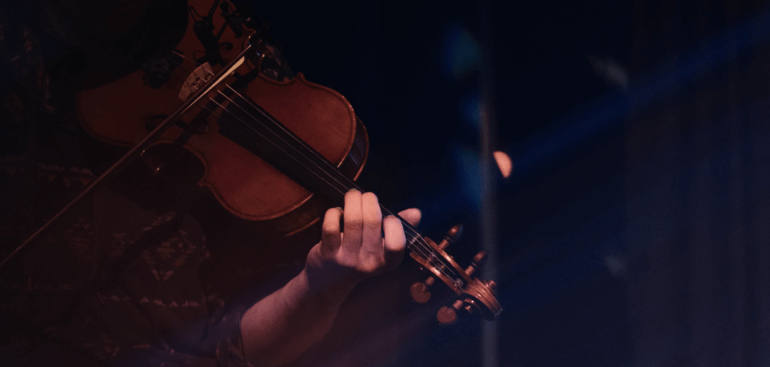
Here’s How to Prepare for the High Holidays With What You Have Right Now
The great violinist Itzhak Perlman contracted polio at the age of four, and for his entire life he had to wear metal braces and use crutches to walk. One time, the great violinist came out on stage, and as he was tuning his violin, one of the strings snapped. Instead of asking for another string, he simply continued to play the whole concert on just three strings (a violin has four strings). When Perlman was finished, the crowd gave him a standing ovation. When they asked him to speak about what happened, he famously remarked, “Our task is to make music with what remains.”
Elul is a time of spiritual closeness, and even the word “Elul” stands for ani l’dodi v’dodi li, “I am for my beloved and my beloved is for me,” but it is also a time to accept our own reality, to appreciate what we have—even if we don’t have all of the strings.
My friend Rabbi Eitan Mayer taught that we can learn a powerful lesson of Elul by reading the word in the reverse. If we spell “Elul” backwards, it reads lamed, vav, lamed, alef. This spells Lulei, which is a combination of two words: lu meaning “if only” and lo meaning “no.” Thus, Lulei literally means “if only, no”—if only things were not the way they are. Much of the year, we live a “Lulei” kind of existence where we say to ourselves: “If only things were not the way that they are, my life would be so much better.”
- If only I got a bigger break at work, I would be so much more successful.
- If only I were smarter, I would be further along in my career.
- If only I were more attractive, people would pay more attention to me.
- If only I had different parents, maybe I wouldn’t have such problems in my relationships.
- If only I had been raised religious, it would so much easier for me to be observant.
If only!
The month of Elul comes along and tells us we’ve got it backwards, because by definition we have exactly what we need to accomplish our goals in life. The great Ramchal—Rabbi Moshe Chaim Luzzatto (eighteenth century)—taught that the deck of cards each of us is dealt is presented to us in the specific way it is, in order to challenge our souls in the precise manner we need to grow. The challenges we are given in life are exactly what we need to actualize our unique potential. That is why, although understandable, it is foolish to desire the circumstances of someone else, since they are different than we are and, therefore, need to be placed in a completely different situation to realize their potential.
What is critical to remember is that it is not what happens to us in life that is important—that is often out of our control—but rather how we react and how we handle the situation. The Talmud teaches us, “Everything is in the hands of Heaven except the fear of Heaven” (Megillah 25a). The “fear of heaven” refers to the values and principles we use to manage the situations in which we find ourselves. That we do have control over. So much else—who our parents are, what we look like, or what kind of religious background we come from—are all circumstances over which we have little or no control. But we can control the attitude and values we apply to whatever situations are thrust upon us, and that is ultimately what shapes and develops us into the people we become. The type of person we become does not depend on our circumstances themselves, but rather on how we respond to them. The great psychologist Viktor Frankl said, “Between stimulus and response there is a space. In that space is our power to choose our response. In our response lies our growth and our freedom.”
And so, sometimes in life, the string breaks, and we’re forced to deal with the situation. Rather than simply becoming upset at the inconvenience, try to visualize your soul needing that difficult moment to get to where it needs to go. In those challenging moments, instead of feeling deprived or playing the “if only” game, let us approach the situation for what it truly is: a growth opportunity. In doing so, we will not only be actualizing our potential but learning to find happiness in what we already have. As the Sages of the Mishnah famously taught: “Who is rich? One who is happy with his portion” (Chapters of the Fathers 4:1).
This article is based on Rabbi Wildes’ new book, The 40 Day Challenge: Daily Jewish Insights to Prepare for the High Holidays (Kodesh Press, 2021). It is available on kodeshpress.com or amazon.com.
If you found this content meaningful and want to help further our mission through our Keter, Makom, and Tikun branches, please consider becoming a Change Maker today.








1 comment
Sort by
Snopes says this is an urban legend as there is no record of it. In any event, no violinist would deliberately start a piece on three strings. However, there have been several notable cases of a violinist finishing a piece when a string snapped, as interrupting the piece in the middle (or right before the end) to change the string would be terribly distracting and ruin the piece. A violin has four strings, each of which covers a range of overlapping notes. If one string snaps (other than the highest string) it is possible to play the same notes by moving the hand higher up on the immediately lower strong. But you wouldn’t want to do it for very long.